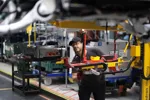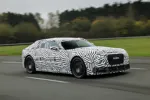Three-quarters of Britons don’t know what an ‘EV’ is, but more than two thirds say they would switch to an electric vehicle, a survey suggests.
More than 3,000 consumers were surveyed nationwide, to gain insight into their understanding of electric vehicles (EVs) and the issues surrounding them, by NewMotion.
The research shows that, although 69% of people would consider switching to an EV in the future, there is still a lack of understanding about what this actually means.
Over the past two years, changes in technology and Government policies have helped EVs gain media traction. But, despite these significant changes, there is still a lack of understanding from the general public, says the EV charge point provider.
More than three quarters of respondents (76%) did not know what ‘EV’ stood for when asked and a quarter of people (27%) didn’t know how they would charge an EV.
Meanwhile, more than half (58%) of respondents think an EV can be charged through an ordinary electrical socket. Whilst this is possible, you’d need the right kind of cable otherwise risk encountering serious problems, says NewMotion. This represents a significant lack of understanding of how EVs are charged and the benefits of smart charging points being faster and cloud-connected compared to charging using any ordinary socket, it said.
Sander van der Veen, UK country manager for NewMotion, said: “It’s the responsibility of governments, car manufacturers and companies like NewMotion, who support the charging infrastructure, to help raise awareness and educate the next generation of car users.”
When asked about why they would switch to an EV, 59% of respondents stated they wanted to help reduce their pollution and 57% of people wanted to reduce their total cost of car ownership.
Furthermore, 46% of respondents recognised that owning an EV would reduce their car tax, while those questioned who already owned an EV claimed that they are saving 15% compared to fuelling a traditional car.
Van der Veen continued: “There’s definitely an appetite from consumers to move away from the traditional petrol/diesel model of transport. Not only are costs increasingly prohibitive, consumers are concerned about the environmental impact of driving with petrol and diesel.
“The introduction of the toxin tax, which sees a clampdown on air pollution in the UK, means diesel motorists will soon be expected to pay daily fees to drive their vehicles, which could add large monthly costs.
“Yet it isn’t as simple as just changing to an EV, we need to help provide a better understanding of how they work and what changes drivers need to make to allow EVs to work for them. With almost 20% of people we spoke to thinking you charge an EV from a portable battery pack speaks volumes about the lack of understanding.”














Login to comment
Comments
No comments have been made yet.